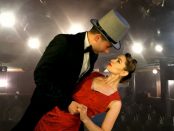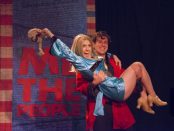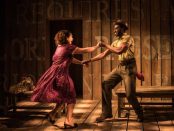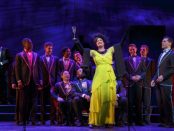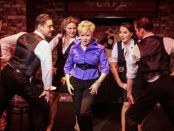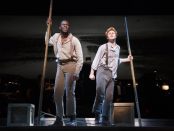Off-Broadway
Writer-performer Bob Martin recycles his sweater-clad disaffected “Man in the Chair” character from his 2006 Broadway musical "The Drowsy Chaperone." The conceit is that he’s a disgruntled Encores! subscriber who has been chosen to pick his selections for inclusion. Mr. Martin addresses the audience to offer commentary, often tells inside jokes and interacts with the cast. Depending on one’s sensibilities, this is either an inspired or an insufferable device. However, it doesn’t mar the actual production. [more]
Mr. Chekhov and Mr. Porter
The first act is a faithful and skillful hour-long condensation of "The Seagull." The second act is a clever hour-long vaudeville-style amalgam of "The Cherry Orchard," "Uncle Vanya" and "The Three Sisters" in the detailed manner of one of Mel Brooks’ cinematic parodies. [more]
Hallelujah, Baby!
While the new cut-down version (performed concert style with book in hand) with nine actors instead of the original 36, now covers 100 years, rather than the sixty in the original show, it still remains a shorthand version of the history of the movement as well as the trials and tribulations of African American performers in show business. Originally written with Lena Horne in mind, when she turned it down the starring role of Georgina Franklin went to newcomer Leslie Uggams and was subsequently revised to accommodate her softer, girl-next-door persona. Although her perky, animated performance won her the Tony Award for Best Actress in a Musical, Laurents was never happy with the compromises made to the show. The more tightly written show which now focuses on four main characters still doesn’t solve all the problems inherent in the material, as directed by Gerry McIntyre it does make for fast-paced musical entertainment with a great many unfamiliar songs. [more]
The Pill
This comedy/drama/fitful musical also suffers from major tonal challenges, as it strains to push all of our emotional buttons. It’s a shame, because the cast gives it their all. Particularly good is Zoe Wilson, as Leni, a severely depressed teenager whose body dysmorphia has led to self-cutting and bouts of suicidal ideation. Wilson is just the right mix of pained and angry. Whenever she speaks, or sings, The Pill feels centered and we’re ready to delve deeper into Leni’s personal struggles. [more]
Josephine: A Burlesque Cabaret Dream Play
The main event, however, is the performance of Harris who doesn’t just imitate Baker but uses her own gifts to illuminate the multitalented cult figure. It’s as if Baker has brought out the best in Harris and she returns the favor with her vivid singing, unabashed dancing and direct connection with the audience. The songs include well-known ditties like “I’m Just Wild About Harry,” “Ain’t Misbehavin’,” “Blue Skies,” a particularly moving “And Then I’ll Be Happy,” “Minnie, the Moocher,” the Civil Rights anthem “Strange Fruit,” “The Times They Are A-changing,” and a heartbreaking “La Vie en Rose.” [more]
America’s Favorite Newscaster
Another irony is that while Fury is kind of a bore, another character is not. Yeah, you guessed it. Him. When the president (David O. Friedman) appears in Fury’s bedroom like the Ghost of Christmas Present, Attea’s writing finally comes to life. His take on you-know-who isn’t unique, but the situation is wonderfully silly, and Friedman’s impression is a funny profile in petulance. [more]
Cruel Intentions: The Musical
As "Rock of Ages" did for the 1980’s, "Cruel Intentions: The Musical" does for the 1990’s. This is a carefree entertainment accompanied by the revelry incited by a two-item minimum in a nightclub. For many audience members, the Proustian pleasure of experiencing songs that they fondly recall shoehorned into the plot from a minor movie they might remember will suffice. It’s decidedly not an event for musical theater connoisseurs. [more]
A Charlie Brown Christmas
Vince Guaraldi’s monumental jazz themes are beautifully rendered by musical director Jenny Shiroma on piano, Laura Hamel on percussion and Billie Sholen on bass. This talented trio also performs marvelous renditions of a number of classic holiday numbers including “The Christmas Song,” Tchaikovsky’s “Dance of the Sugar Plum Fairy” from The Nutcracker, and “Silent Night.” Most crucially they do great justice to Mr. Guaraldi’s wistful “Christmas Time Is Here.” [more]
Bulldozer: The Ballad of Robert Moses
Moses’ famously crowded and contentious career is glossed over except for his final battle with Jacobs over the Lower Manhattan Expressway. "Bulldozer" doesn’t even give a good summary of his long and length exploits. Although the program lists the time scheme, there is nothing in the show to let us know how much time passes between any of the scenes. The dialogue does a lot of name dropping (Al Smith, Jimmy Walker, Fiorello LaGuardia, Franklin D. Roosevelt, Walter O’Malley) without making any of these people real. Hardly any of the songs forward the plot but instead tell us what we already found out in the preceding dialogue scene. The song lyrics have endlessly repeated refrains and choruses which is typical of rock and pop songs but death in a theatrical presentation in which we expect more information and cleverer wording. [more]
Irving Berlin: In Person
Deffaa’s great achievement is joining the narrative portions with just the right song. An anecdote about encountering Florenz Ziegfeld having an office dalliance with a chorus girl is followed by “A Pretty Girl is Like a Melody.” “I Love a Piano” is preceded by Berlin’s extolling of his beloved piano nicknamed “Buick. ” [more]
Hundred Days
Written by The Bengsons and Sarah Gancher, the show presents a stylized take on the couple’s love at first sight meeting, the complications it caused with their partners at the time, their instant romance and quick marriage. It’s a New York story as they lived in Astoria, there’s mention of a memorable walk from Canal Street to The Cloisters, and a trip to Coney Island is pivotal. [more]
Cross That River: A Tale of the Black West
Serving as both narrator and protagonist, Harris portrays Blue, a runaway slave who crossed the Sabine River from Louisiana to Texas in search of his elusive freedom. To tell us everything that came before and after this momentous event, Harris is joined by three other impressive vocalists/performers in a concert-style presentation that has all the charm and verve of an old radio play. [more]
The Mad Ones
Kait Kerrigan and Brian Lowdermilk’s original book is filled with incidents, vignettes, reflections, observations, and flashbacks, but short on actual plot. There is deciding on which college to attend, or not to go to college at all in order to find oneself, and the suspense of passing a driving test. A tragic occurrence is a major event. [more]
Billy and the Killers
In their new rock musical "Billy and the Killers," lyricist/librettist Jim Shankman and composer Peter Stopschinski channel Nicholas Ray, David Lynch, Elvis Presley, and Dashiell Hammett to concoct a muddled tale of teenage rebellion that dead-ends in an even less coherent murder trial. Along the way, there are some well-performed songs whose lyrics seem to be tied to the plot, but it’s often hard to tell, since, as you probably already know, proper enunciation is not what rock ‘n’ roll is all about, man. [more]
Red Roses, Green Gold
The score is comprised of Jerry Garcia & Robert Hunter’s Grateful Dead music and lyrics with additional music and lyrics by Phil Lesh, Mickey Hart, Bob Weir, and Bill Kreutzmann. It’s all an engaging patchwork well-realized by Jeff Chimenti’s polished musical supervision and arrangements. Though it’s wonderful experiencing such spirited renditions of Grateful Dead classics such as “Truckin,” “Casey Jones,” “Alabama Getaway” and “A Touch of Grey” by the talented ensemble, "Red Roses, Green Gold" doesn’t really cohere into a satisfying work of musical theater. [more]
This One’s for the Girls
During the jam-packed ninety minutes of "This One’s For the Girls," the foursome run through a batch of songs that show the ups and downs of the last one hundred or so years through the eyes of women. Ms. Marcic puts her characters through the romantic, social and professional wringer. Their individual tales are illuminated by songs and clever dialogue, helped by the set design of Josh Iacovelli which includes walls painted with artful pictures of famous ladies and a continuous slide show of portraits and scenes of historic and social importance such as fashions, sheet music, popular literature and family portraits. Mr. Iacovelli also designed the subtle lighting which makes the most of the tiny stage. [more]
Bells Are Ringing
Boycott gets to sing a bounty of scintillating songs including “It’s A Perfect Relationship,” “Is It A Crime?,” “I’m Goin’ Back” and her duets with Heuser in “Better Than a Dream” (written for the film version) and “Long Before I Knew You.” Colgan’s choreography includes witty dance numbers to “Independent,” “I Met a Girl”, “Mu-Cha-Cha,” and “The Midas Touch.” Sue and Otto have a hilarious parody of the operetta aria in “Salzburg (By the Sea),” and the singer and girls of the Pyramid Club do a clever take on a cut-rate Busby Berkeley number to “The Midas Touch.” [more]
{my lingerie play} 2017: THE CONCERT AND CALL TO ARMS!!!!!!!!! THE FINAL INSTALLATION
As the show progresses with intermittent songs, the other musicians/singers (Ryan McCurdy, Matt Park, and Rocky Vega) also strip down to their underwear/lingerie. The sounds they all make are, at times, infectious. And Oh is a natural-born performer, who instantly has us in her thrall. Though the show has been co-directed by Orion Stephanie Johnstone and Oh, it’s hard to imagine anyone reining in its star. And if the “first installation” of Oh’s latest show occurred when she stood on a soap-box in Times Square pontificating in 2014, it’s hard to say how it’s progressed since then. Unless you were there, you just wouldn’t know. [more]
Desperate Measures
While not all musicals from Shakespeare have worked and updates are particularly risky, "Desperate Measures" avoids all of the pitfalls and is a refreshing and satisfying work in its own right. The catchy score has superb songs in the vein of the Broadway western musical. It is hoped the show has a long life beyond this production, like its young hero, in years to come. [more]
The Apple Tree
Part of the problem is the lack of innovation in Ray Roderick’s staging in this show which calls out for invention and clever handling of sets and props. Devin Vogel’s colorless stage design (making use mainly of a ladder in the first and third stories) and Hope Salvan’s equally colorless costumes for most of the show (pale grey and blue tee-shirts and jeans for the first one-act) do not help bring any atmosphere to the three separate stories which span the time scheme from Biblical days up to the present. All three stories are narrated or introduced by The Balladeer who also plays the Snake in the first story. While such songs as the catchy “Forbidden Fruit,” the lovely “What Makes Me Love Him?,” the sultry “I’ve Got What You Want,” and the folk-rock ballad, “You Are Not Real” still impress, the musical staging is lacking in showmanship and pizzazz. [more]
Loveless Texas
Although the plot has been reset in Loveless, Texas and New Orleans, Louisiana, circa 1929, it is an improvement over the original story as a romantic comedy: Shakespeare’s version ends with a death and four pairs of lovers departing and agreeing to meet in a year’s time. Loveless, Texas puts the funeral at the end of the first act, and brings all four couples, plus two more, together by the final curtain, which is much more satisfying. (No spoiler this as it is obvious what will happen – just not so obvious how they will get there.) [more]
Van Gogh’s Ear
Projected titles indicate place and year—beginning with Arles, 1888 and progressing until van Gogh’s suicide—which we hear as an offstage gunshot—in July of 1890. The audience is treated to Vincent’s thoughts on his painting technique, his poverty, his mental health, his fellow artists, stars, sunflowers, all interrupted by chamber music by Debussy, Fauré, Chausson and Franck played—in various combinations—by Henry Wang (violin), Yuval Herz (violin), Chich-Fan Yiu (viola), Timotheos Petrin (cello), Max Barros (piano) and Renana Gutman (piano). [more]
Come Light My Cigarette
But Cohen the composer is another matter entirely--his jazz-inflected songs make "Come Light My Cigarette" a gem of a chamber musical. As more and more of the songs are revealed, time and again one is reminded of "Trouble in Tahiti." And like that classic Leonard Bernstein opera, "Come Light My Cigarette" appears to be set in the 1950’s, which the music evokes. So do the busy but impressive set and costumes, both designed by Craig Napoliello. [more]
Lili Marlene
The songs never come up to the title song made famous by Marlene Dietrich who’s mentioned several times during the play. Antin’s attempt at playful seduction, “Take Me Home Tonight,” sung by the half-dressed cabaret girls and his German-style drinking song, “Fill My Stein with Beer” are pleasant pastiche, but “How Can Germany Survive?” (sung by the beleaguered Willi) and “Time to Stand Up” (sung by Josef) are heavy-handed and obvious. The lyrics throughout, even in the love songs are of the “moon-June” variety, but, as mentioned, are sung with great feeling. [more]
Jerry’s Girls
The revival at the York is being seen in yet a new version of the show that began as a cabaret in 1981 and went to Broadway in 1985. Created by director Larry Alford, choreographer Wayne Alford and composer Herman, the original show included new songs written especially for the show, only one of which remains in the revival. However, as directed by Pamela Hunt ("The Musical of Musicals"), this version of "Jerry’s Girls" organizes the songs more faithfully by around each show and includes the greatest hits from "Hello, Dolly!," "Mack and Mabel," "Milk and Honey," "Mame," two numbers from "Dear World," and ending with a medley from "La Cage aux Folles." Along the way are also two unfamiliar numbers from Herman’s 1960’s revue "Parade." [more]
Curvy Widow
While the dialogue offers some stabs at humor and Opel--a first-rate comedienne of the old school--usually excels at comic timing, much of it falls flat here. Most of the 90-minute, intermission-less piece focuses, naturally enough, on Bobby’s attempts to create a new life for herself, ultimately meaning a new relationship. It’s during her second visit with the shrink that he says, “I’m making getting laid a medical directive”-- to which Bobby replies, “Can you do that?” effectively ending the scene. [more]
Georama: An American Panorama Told on Three Miles of Canvas
Book writers West Hyler and Matt Schatz have taken these facts and woven a charming piece of Americana that explores idealism coming up against cynicism. It’s very well structured, amusing and thoughtful. There are a few zingers that could be interpreted as referring to President Trump. Their chief conceit is having Banvard’s early associate Taylor, later become Barnum, and their rivalry becomes a focal point of the show. [more]
Backbeard: The Musical
Matthew McElligott, Larry Tuxbury and Brian Sheldon’s book is a witty, smart and sharp take on pirate lore laced with a child’s sense of individuality, tolerance and inclusivity. It’s adapted from Mr. McElligott’s acclaimed series of children’s books. McElligott, Mr. Tuxbury and Michael Musial’s lyrics are quite accomplished and chock of full of crafty rhymes such as scarf with barf. Mr. Musial’s euphorically tuneful music completes the marvelous score, that’s perfectly rendered by Barbara Musial’s skillful music direction. [more]
Money Talks: The Musical
The genial Ralph Byers’ performance as Franklin is heroic as he is onstage for virtually the entire length of the show. Mr. Byers marvelously sings, dances and cracks wise, while channeling the familiar Franklin persona with his wry vocal delivery. Byers exudes dignity, serenity and focus despite the deficient material. [more]
Night Tide
Mora works as a mermaid in a tank at the sideshow owned by the crusty, old Captain Murdock who rescued and raised her. As her romance with Johnny blossoms, there are complications. Her previous two boyfriends died under mysterious circumstances. An ominous woman in black mills about and there’s a fortuneteller looming over the action, as the plot builds to a tragic finale. There is also the possibility that Mora is a real mermaid. [more]
Matthew McConaughey vs. The Devil: An American Myth
Vamping and slinking around in a bright, red tunic laden with rhinestones and wearing black tights, the vivacious Lesli Margherita steals and salvages the show as Mephistopheles. With the physical allure of the young Gina Gershon and the musical comedy talents of the young Donna Murphy, and her own quirky persona, Ms. Margherita is commanding. It’s a proverbial case of “I couldn’t take my eyes off her,” and “everything she said and did got a laugh.” [more]
Errol and Fidel
Conveying the premature decrepitness of Errol Flynn with flair is Jonathan Stewart. His hair styled and with a thin mustache, the charming Mr. Stewart resembles Flynn and channels his dissolute persona and good humor with a melodious, slight Australian accent. The bearded and youthful George Psomas totally captures the look and essence of the early Fidel Castro with his edgy bearing. Combining sensuality, a lush singing voice and superior comic timing, Mr. Psomas is delightful. He and Stewart’s scenes together energize the show, particularly their clash near the end. [more]
Woody Sez: The Life and Music of Woody Guthrie
Physically lean, with gaunt but animated features, the immensely charming David M. Lutken plays the narrator and sings many of the numbers. Mr. Lutken magnificently captures the essence of Guthrie with his wry twang, beaming smile and dramatic presence. This dimension is complete when he puts on a blue cap like Guthrie’s iconic one. That image is on display onstage, with a cigarette dangling from the side of Guthrie’s mouth. [more]
Bastard Jones
Bastard Jones is surprisingly accessible for a contemporary musical based on a long and episodic 18th century novel. Sophisticated and off-color, naughty but nice, it proves to be a sharp and irreverent entertainment. With a terrific cast and a star making performance by Evan Ruggiero, witty and clever, Bastard Jones is both a delightful 18th century and 21st century evening in the theater. [more]
Me the People: The Trump America Musical
The animated and charismatic Mr. Spitaletta is the standout of the cast, vibrantly appearing in numerous roles. Highlights of his portrayals are a commanding Russian agent spoofing Danny Kaye’s tongue-twisting patter number "Tschaikowsky (and Other Russians)" from Kurt Weil’s "Lady in The Dark," and a rollicking caricature of Richard Nixon. Mr. Spitaletta is an ever-present delight. [more]
Bella: An American Tall Tale
Featuring an energetic, game cast headed by bigger-than-life Ashley D. Kelley as the title character, "Bella" follows this “big booty Tupelo girl,” as she travels (under an assumed last name) to meet her staid fiancé, Buffalo Soldier Aloysius T. Honeycutt (handsome, sweet voiced Britton Smith) and to escape the law. She meets a slew of fascinating characters—some who really existed and some fictitious—and finds her life taking a surprising turn in her bumpy road to marital bliss. [more]
Attack of the Elvis Impersonators
Lazarus’ score is an entertaining blend of rock, pop and show tunes. None of Elvis Presley’s actual songs are heard, but there are a number of clever takeoffs such as “Viva Milwaukee!” and “Spread the Word of Hound Dog.” His good-natured book is a shambles. The serious, campy and satirical elements don’t connect. The plot is crammed and wayward. It recalls the 1960’s "Batman" television show as well as counterculture fantasies such as the 1968 film "Wild in The Streets" and Brian De Palma’s movie, "The Phantom of The Paradise." [more]
Sweetee
"Sweetee" is an admirable attempt to depict determination in the face of prejudice in the Deep South 80 years ago. While the cast appears to be older than their characters, they make a valiant attempt to make more out of the material than the show has going for it. Unfortunately, "Sweetee" seems rather thin considering the possibilities inherent in the story line. The score is pleasant but innocuous and unmemorable, always a deal breaker in a musical. Ironically, the most effective musical numbers are the actual interpolated hymns: "Amazing Grace," "This Little Light of Mine," and "Joyful, Joyful." [more]
The Boy Who Danced On Air
It is set in present-day rural Afghanistan. Several years earlier, Paiman as a child was sold by his father to the well to do Jahandar. The two have an intense emotional and physical involvement that must soon cease, as Paiman is soon to marry because he is approaching manhood. Feda, Zemar, the dancing boy of Zemar, Jahandar’s droll, and mean cousin, is also aging out. Paiman and Feda fall in love and that instigates several conflicts. [more]
Pacific Overtures
The playing space designed by Doyle is a narrow white runway with a stool at one end and at the other, an archway created by continuing the flooring into the air on which Japanese writing appears as on a banner. The audience sits in stadium-type seating on either side of the playing space. Eschewing pageantry, the production puts the cast in very bland outfits of black, grey, white, blue or beige (costumes by Ann Hould-Ward), adding fabric or robes when absolutely necessary. The lighting by Jane Cox occasionally bathes the stage in either red or blue mood lights. [more]
The View UpStairs
On the fourth anniversary of the Stonewall uprising in 1973, an arsonist set fire to a gay bar in New Orleans, killing 32 people. This tragic yet forgotten episode in gay history is not only part of a Harvey Fierstein monologue in "Gently Down the Stream"—currently playing at the Public Theater--but also the subject of "The View UpStairs," a new Off Broadway musical that has a lot of spark, but ultimately not enough fire. [more]
The Golden Apple
Handsome musical theater leading man Ryan Silverman is a commanding Ulysses with his operatic singing. Jeff Blumenkrantz is marvelously humorous and pitiful as Menelaus, Helen’s jilted husband. N’Kenge is fierce and bewitching as Mother Hare, a soothsayer-like figure. Ashley Brown is wonderfully comic as the mayor’s wife. Though silent as Paris, the youthful Barton Cowperthwaite’s superior ballet skills make a great impression. [more]
Ernest Shackleton Loves Me
McCollum is both charming and charismatic playing among other characters the self-entitled and irresponsible Bruce, the hippie techie Sal, Kat’s spaced-out boss Madison, and the intrepid and heroic Shackleton, although at first it is not obvious that he is all of these characters. It is a bravura performance showing tremendous range as he makes each one entirely different. Vigoda is another story. Her Kat is plucky but is mainly a device to get Shackleton to tell his story. We never learn much about her and she never changes as the adventure unfolds. Her violin playing is excellent but it is a bit of a distraction from her other activities in the musical. [more]
Marry Harry
The two leads David Spadora and Morgan Cowling are charming but that isn’t really enough to carry the show. The script isn’t too kind to their parents. As Big Harry, Lenny Wolpe is overbearing and possessive and as Sherri’s mom Francine, Robin Skye is controlling and possessive. Both are quite convincing and unpleasant – just as the script wants them to be. As the Village Voices, Chavez, Manocherian and Saunders demonstrate tremendous versatility playing all sorts of roles and are excellent singers. [more]
The Lightning Thief: The Percy Jackson Musical
Theaterworks NYC’s stage version of Rick Riordan’s best-selling novel, "The Lighting Thief," about Percy Jackson and other demi-gods, first seen in 2014, has returned in an expanded two act format that, from reaction of the audience at the Lucille Lortel Theatre, is sure to become a cult musical. This fast-paced fantasy-adventure story would not seem to be destined for the stage due to the number of special effects needed to tell the story. However, designer Lee Savage and other technicians have come up with a series of clever low tech solutions which are always inventive and always witty. Using masks, puppets and elaborate costuming, five members of the cast of seven play multiple roles which often require quick changes. [more]
Du Barry Was a Lady
The show has a great many topical references to celebrities of 1939 (Minsky, Sophie Tucker, Tallulah Bankhead, Franklin and Eleanor Roosevelt) not all of whom still ring any bells for most theatergoers. Aside from the justly famous “Friendship,” which has also been interpolated into Anything Goes since the 1962 NY revival, the show is second-rate and unfamiliar Porter. Ironically, three of the songs (“It Ain’t Etiquette,” “Well, Did You Evah!” and “Friendship”) resurfaced in Peter Bogdanovich’s flop original movie musical, At Long Last Love, in 1975. The patter songs, “But in the Morning, No,” “Give Him the Oo-la-la,” “Well, Did you Evah!,” and “Katie Went to Haiti” have clever lyrics but are not up to Porter’s usual standard. [more]
Diva: Live From Hell
"Diva: Live From Hell," an energetic, campy variation on the “All About Eve” theme, is performed with manic glee by Sean Patrick Monahan who also wrote the book and created all the colorful characters. His partner in crime is Alexander Sage Oyen who provided the music and lyrics. Sex (requited and unrequited), ugly violence and dark humor are all thrown into the story which is told by Desmond Channing (Monahan, who also plays virtually a high school’s worth of characters). [more]
Joan of Arc: Into the Fire
Don’t blame singer Jo Lampert who gives a passionate performance as the Maid of Orleans. Unfortunately, she hasn’t been given anything very interesting to sing in this mostly sung-through musical. Her lyrics are trite and repetitious. She may have been a teenager, but there is no reason to have written lyrics that continue to sound like they were written by a junior high school student attempting his or her first songs. The endlessly repeated refrains do not serve to make Joan seem more simple and holy but sound like a lack of imagination. The minimal spoken dialogue is used for the various narrators and the trial testimony taken from the actual transcript of the event. [more]
The New Yorkers: A Sociological Musical Satire
Herbert Fields’s book was based on a story by E. Ray Goetz and New Yorker cartoonist Peter Arno. This clunky concert adaptation by Jack Viertel is crammed with double entendres, puns, anachronisms, and contemporary inside jokes that mostly thud. [more]
Anything Goes
The score which has been drawn from the four previous New York productions of Anything Goes plays like a Cole Porter greatest hits parade and almost all of the songs are among his most popular masterpieces. Played by a three piece combo expertly led by Christopher Stephens, the show has just the right syncopated thirties sound, while the perfect diction on the part of the large cast makes every lyric a gem. The dazzling production numbers which often evolve into precision tap dances with most of the 18 member cast trapping in unison are as dazzling as Jack Maisenbach’s brightly colored, coordinated costumes. This excellently cast production has dancers, singers, comedians and character actors all work at the top of their game. [more]
Kid Victory
It would be difficult to imagine anything darker than the content of the second musical collaboration by John Kander and Greg Pierce having its New York premiere at the Vineyard Theatre. Possibly Kander’s own"Cabaret" or "The Visit" - but both take place long ago and in faraway lands. Kid Victory relates the tale of a 17-year-old youth who was kidnapped for a year and has returned to his Kansas family. All the members of the community want to behave as though nothing has changed but for Luke Browst nothing is the same and things can’t go back to the way there were before. [more]
Louisiana Purchase
Based on a story by lyricist/bookwriter/producer B.G. DeSylva (“Good News,” “The Best Things in Life Are Free,” “The Varsity Drag”), this musical satire sends unworldly, teetotaler Oliver P. Loganberry, “the Watchdog of the Senate,” to New Orleans to investigate the corrupt dealings of the Louisiana Purchasing Company run by Jimmy Taylor, Colonel Davis, Junior Davis, Dean Manning of the university, and Captain Whitfield of the city government. Jimmy, the president of the company, who was out of town when the others used his powers of attorney for their illegal scheme, is left to sort out the mess. [more]
Dear World
Having played such indomitable women as Mama Rose and Maria Callas, Daly slips into the role of the Madwoman of Chaillot which fits her like a glove with her crisp, authoritative delivery. As a woman who refuses to see reality for what it is, she gives a powerful rendition of “I Don’t Want to Know,” the show’s only hit song. She does a lovely job with the new number, “A Sensible Woman,” as well as the haunting ballad, “And I Was Beautiful.” [more]
Interview: A New Musical
Composer Soo Hyun Huh’s original music is a fine and eclectic assortment of modern melodies. The English lyrics are written by Bryan Michaels. The combined results are stilted and pedestrian. The score is primarily sung dialogue with some actual if indifferent songs. Mr. Michaels has also translated Jung Hwa Choo’s book into English. [more]
Berlin to Broadway with Kurt Weill: A Musical Voyage
One of the remarkable things about the theater songs of Kurt Weill is that like the later songs of Stephen Sondheim they are all really little one act plays which give the performers a great deal of latitude in how to perform them. As sung by Karl Josef Com, Rachel de Benedet, Michael Halling and Meghan Picerno and as narrated by Brian Charles Rooney, Berlin to Broadway with Kurt Weill is an extraordinary musical voyage through some of the greatest theater songs of all time written by among the best talents of the 20th century. [more]
Big River: The Adventures of Huckleberry Finn
Red-haired, animated and engagingly boyish, 18-year-old Nicholas Barasch is sensational as Huckleberry Finn. Mr. Barasch is onstage virtually the entire time and winningly carries the show. As Jim, the runaway slave, Kyle Scatliffe brings dignity, forcefulness and powerful vocal ability during his commanding performance. [more]
Bound to Rise
Unfortunately, Policoff’s book is too cluttered with characters too allow for much development. While some of his lyrics are clever, most are prosaic and heavy-handed. As played by music directors Gregory Nissen and Jonathan Matthews, the score sound tinny, rather than melodic, for its 1890’s period. The direction by Oliver Conant, with an assist by Paul Murphy and Regan Batuello, is all over the place using various parts of the shabby (uncredited) set, so that it is too busy for its own good. This free-wheeling approach would be more suitable to a movie rather than the stage without a much strong hand in control. Occasionally the actors make a pithy remark about society or the political order and then freeze, starring at the audience. This Brechtian technique goes against the grain of the rest of the production, as does various character narrating themselves or others. [more]
Milk and Honey
While the jokes may be hoary, Unger’s production has cut down on the show’s sentimentality and given it a sharp edge which elevates the material. As the heroine Ruth, Runofsson is genuine, contemplative and sympathetic, while Delavan’s Phil is the strong silent type. They have the bulk of the songs and give lovely renditions of “There’s No Reason in the World,” “That Was Yesterday,” “Let’s Not Waste a Moment,” “As Simple As That.” Korey as the gossipy yente Clara Weiss who is free with her advice steals every scene she is in and gets to sing the clever ode to her late husband, “Hymn to Hymie” as well as lead the hilariously staged number, “Chin Up, Ladies” which includes witty audience participation. [more]
























